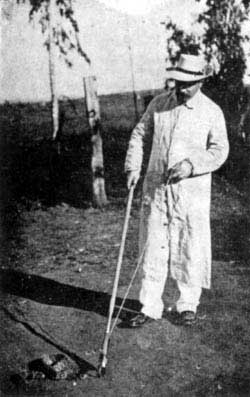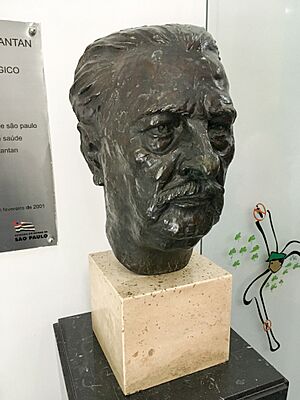Vital Brazil facts for kids
Quick facts for kids
Vital Brazil
|
|
|---|---|

Vital Brazil c. 1892
|
|
| Born |
Vital Brazil Mineiro da Campanha
April 28, 1865 Campanha, Minas Gerais, Empire of Brazil
|
| Died | May 8, 1950 (aged 85) |
| Citizenship | Brazilian |
| Scientific career | |
| Fields | Immunology |
Vital Brazil Mineiro da Campanha, known as Vital Brazil (born April 28, 1865 – died May 8, 1950), was a famous Brazilian doctor and scientist. He was an immunologist, which means he studied how the body fights off diseases and poisons. Vital Brazil is best known for creating the first antivenom that worked against bites from many different types of venomous snakes at once. He also developed the first antivenoms for scorpion and spider bites. He founded the Butantan Institute in São Paulo, a world-famous research center focused on studying venomous animals.
Contents
Vital Brazil's Life Story
Vital Brazil Mineiro da Campanha was born on April 28, 1865, in a town called Campanha in Brazil. His father gave him this special name to honor his country, state, and hometown.
He became a doctor in 1891, after studying at the Rio de Janeiro School of Medicine. To pay for his studies, he worked as an assistant in a science class. After graduating, he started working in public health, helping to keep communities healthy. He saw many common diseases of that time, like smallpox and yellow fever.
Vital Brazil became very interested in medical research. He was especially curious about how the body fights off infections and poisons. In 1896, he started studying snake bites and even collected snakes for his research.
In 1897, he moved to São Paulo and joined the Bacteriological Institute. There, he worked on creating treatments for diseases like the bubonic plague. He even got very sick from the plague himself but thankfully recovered.
Because of his amazing work, the government of São Paulo opened a new institute in 1901 and asked Vital Brazil to lead it. This became the famous Butantan Institute. He also founded another important institute in Niterói in 1919, which is now called the Vital Brazil Institute.
Vital Brazil traveled to Europe and the United States to share his scientific discoveries. He worked at the Butantan Institute for many years until he retired in 1919. He passed away on May 8, 1950, remembered as one of Brazil's most important scientists.
How Vital Brazil's Work Helped People
The new institute Vital Brazil led was built in a place called Butantan. It quickly became a very active research center. They produced vaccines and antivenoms to prevent and treat many serious diseases. These included tetanus, diphtheria, yellow fever, smallpox, and diseases that spread from animals to humans, like rabies. The institute became known worldwide as the Butantan Institute and is still doing important work today.
Vital Brazil believed that poisoning from venomous animals, like snakes, scorpions, and spiders, could be treated with special medicines called antisera. Antisera contain antibodies, which are like tiny soldiers in your blood that fight off harmful substances. Another scientist had shown this worked for the Indian cobra venom.
Vital Brazil started his own experiments. In 1901, he proved that antivenoms made for Asian snakes did not work against snakes in South America. So, he created his own antivenoms for the most common venomous snakes in Brazil, like the jararaca, rattlesnake, and coral snake.
He discovered that the venoms from jararacas and rattlesnakes had similar effects. This led him to create the first polyvalent antivenom. This special antivenom could treat bites from both types of snakes at the same time! This was a huge success. Before his work, more than 20% of people bitten by these snakes died. After his antivenom, this number dropped to less than 2%.
Vital Brazil and his team used a clever method to make antivenom. They would give small, safe doses of venom to animals like horses and sheep. The animals' bodies would then produce antibodies to fight the venom. Scientists would then collect blood from these animals, extract the antibodies, and purify them to create the antivenom.
Using these techniques, Vital Brazil also developed the first antivenoms for scorpion stings (in 1908) and spider bites (in 1925). His work even made headlines in the USA when his antivenom saved a worker bitten by a rattlesnake at the Bronx Zoo in New York City.
More importantly, the Butantan Institute became a place where many new Brazilian scientists were trained. These scientists went on to start new research labs and schools, greatly helping medical and biological research in Brazil.
Vital Brazil's studies went beyond just snakes. He and his team also looked at how venoms affect the body in different ways. They studied the many natural chemicals found in venoms. He also researched animals that eat snakes, like the mussurana snake and certain mammals and birds. His book, La défense contre l’ophidisme (Defense Against Snakebites), published in 1914, became famous around the world.
Vital Brazil's Lasting Impact
Vital Brazil is honored in the scientific names of four types of South American snakes:
- Rhachidelus brazili Boulenger, 1908
- Drymoluber brazili (Gomes, 1918)
- Bothrops brazili Hoge, 1954
- Chironius brazili Hamdan & Fernandes, 2015
See also
- Science and Technology in Brazil
 | James Van Der Zee |
 | Alma Thomas |
 | Ellis Wilson |
 | Margaret Taylor-Burroughs |



